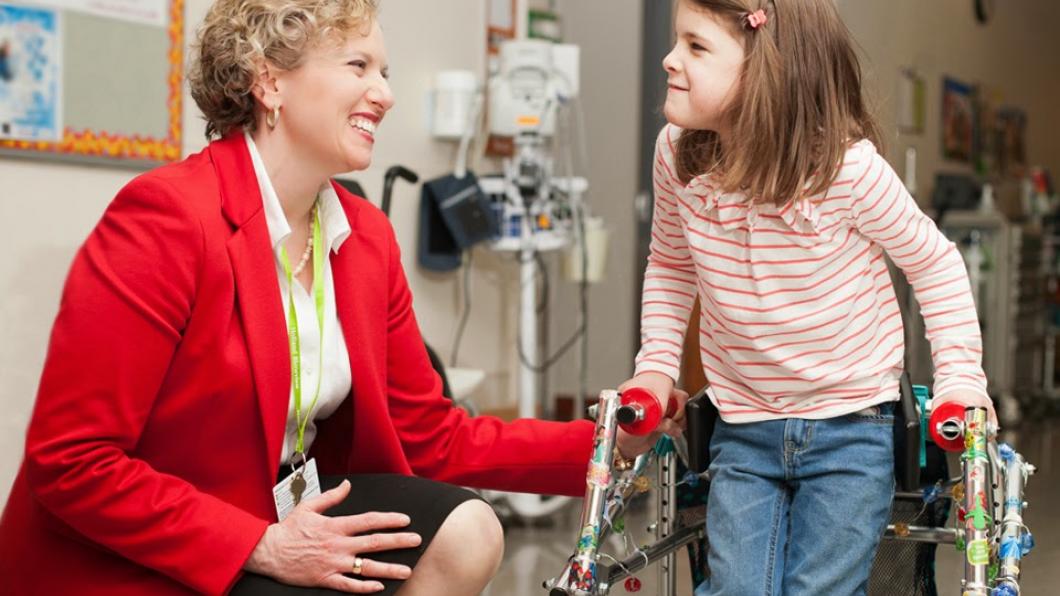
BLOOM media roundup
Looking for an interesting read? Check out the disability and parenting stories we've collected recently.
But first, I'd like to introduce you to Julia Hanigsberg, the new president and CEO of Holland Bloorview (in photo with Jillian Peters). You can get a unique window into Julia's first few weeks at the hospital on her blog or follow her on Twitter @Hanigsberg. Julia comes to us from Ryerson University, where she was vice-president of administration and finance. She's the parent of a child with a disability. You'll hear more about Julia in an upcoming piece in BLOOM. Welcome Julia! Louise
Homeschooling, and teaching, a child with Down syndrome The New York Times Motherlode blog
BLOOM contributor Kari Wagner-Peck debuts in The New York Times with a piece on what happens when she homeschools her son with Down syndrome. Kari always writes with humour and great insight.
Trapped in a virtual coma but aware, Martin Pistorius breaks free, CBC The Current
Martin Pistorius was a healthy South African 12-year-old until meningitis took his ability to move and speak. Doctors told his parents he was 'a vegetable.' Years later he regained the ability to communicate. This morning he did this interview with his voice device.
Airlines break too many wheelchairs Al Jeezera America
Excellent piece on how common it is for airlines to break wheelchairs and the impact this has on frequent flyers.
How to measure a medical treatment's potential for harm The New York Times
Fewer people benefit from medical therapies than we think. The Number Needed to Treat (NNT) tells you the number of people who would need to receive a therapy in order for one person to benefit. The Number Needed to Harm (NNH)is the flip side. Interesting.
Simple solutions make the difference Scope Charity
How a mom who is three foot six and has brittle bone disease is raising a son she can't pick up with creative adaptations. For example, plywood steps covered in soft foam and fabric allow her to climb from her wheelchair onto the sofa and then from the sofa independently move onto the floor to play with her son.
Parents of disabled children must change their loved ones on public toilet floors Irish Mirror
Parents in a number of countries, including Ireland, talk about how inaccessible bathrooms limit their families. They're calling for designated bathrooms with a ceiling track hoist and a height-adjustable adult changing table.
For special-care residents, New York state policy means leaving home The New York Times
Heartbreaking piece about how challenging the move from an institution to the community will be for a 50-year-old man with severe autism who's lived in an institution for most of his life and finds comfort in its routine.
Making a place for disabled young adults to live, learn The Boston Globe
A mother creates a residence and day program for adults with autism, like her son, and other developmental disabilities. But the price tag is steep: US $125,000 per year.
Legoland bans disabled men from park because of protection policy The Independent
Two British adults with developmental disabilities whose families bought them passes to visit Legoland are barred from attending with their caregivers due to 'safety' of other children. The policy is small-minded.
A new face for Violet The New York Times video
A surgeon uses a plastic 3D printing model of a child's skull to practise cuts prior to conducting a complicated facial surgery.
Parenting expert writes about raising four struggling kids The Toronto Star
Can't wait to see Ann Douglas' new book Parenting Through The Storm about raising four children: one with depression, two with attention deficit and one with Asperger's.
What Facebook means to special-needs families The Huffington Post
For parents who have children with rare diseases or disorders, special equipment, body differences or something that makes them extra unique, Facebook is the most precious invention ever.
An ER doctor sees the health-care system through a patient's eyes Chatelaine
Dr. Brian Goldman writes an eloquent piece about being on the other side of the fence during a discussion about placing a DNR on a family member, his father.